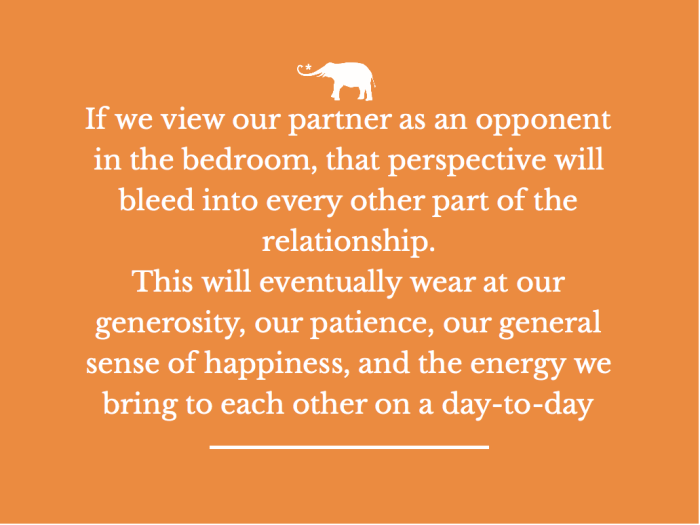Most of the clients I see in my coaching practice share a common dilemma…
They’re lacking sexual self-confidence.
Life and circumstances have taken a toll on their confidence in themselves as lovers, and without that foundation of security, taking steps toward a better sex life, seems daunting and doubtful.
For those who find themselves in sexless marriages, or relationships that suffer from mismatched desire, often have a history of sexual strife. This happens over time; each experience of silent rejection, failed initiation, or obligatory, disconnected sex, wears at our confidence. It challenges the belief in our ability to turn our partner on, or turn ourselves on.
It only makes sense, that we will protect ourselves from these difficult feelings, but the strategies we often use to do that, undermine attaining the very thing we want from our partner, which is passion and connection.
When we lose our confidence in ourselves as lovers, we withdraw our enthusiasm and withhold affection. We find ourselves creating demands and confrontations.
We see our partner as our opponent, and sex as a negotiation. Our partner becomes someone we believe we need to defend ourselves against. It’s a dynamic that depletes both partners of their sexual confidence, and undermines their belief in themselves as sexually desirable, and worthy as lovers.
Acknowledging this destructive dynamic, and making an agreement to put the armor of self-protection down, is the first step to transforming the battle into an alliance.
There are no winners in bedroom wars.
The Different Challenges of Sexual Confidence:For the masculine
Orgasm control, or erection challenges can trigger a loss of confidence. They may worry that the size of their penis is unsatisfactory for their partner. It may be their belief in their abilities to please their partner, or trusting that their sexual initiations will be welcomed.
For the feminine
Body image plays a big part in their sexual confidence. If they question their attractiveness, their confidence is lost. If they are self-conscious about their path to orgasm, their enjoyment will be inhibited. The multi-tasking, feminine mind often finds itself easily distracted and therefore less able to fully let go. This impacts their perception of themselves as lovers with a healthy libido.
For the higher desire partner
Confidence comes with the belief that they are desirable. If they question their desirability, their enthusiasm will be undermined, reducing sex to a disconnected bodily function, rather than a shared erotic enjoyment with their partner.
If the higher desire partner isn’t sure if their partner wants them, enjoys sex with them, or is attracted to them, then it’s only natural that the ease around sexual communication, and the enjoyment of sexual exploration will be dampened. If they lose confidence that their initiations will be welcomed, they may step back from initiating sex altogether, in order to avoid the pain of rejection.
For the lower desire partner
Confidence comes with knowing that they are understood in how arousal works in their bodies, and that their enjoyment matters. If they are often in the position of negotiating their partner’s desire, they lose confidence that they have any desire of their own.
Sexual confidence comes with believing that they are wanted for more than sex itself. When the lower desire partner feels opened up by emotional connection and unhurried sensual seduction, they will connect to their own inherent desire and arousal.
Creating An Environment For Sexual Confidence to Flourish
Sexual confidence is largely an inside job, and requires us to examine the thoughts and beliefs that hold us back from expressing our authentic sexual selves. There are a number of processes to help unravel unhealthy perspectives, fed to us by our inner critics.
For couples in longer-term relationships, they can start a conversation about how they can support each other’s sexual self-confidence, starting by acknowledging that confidence needs to be affirmed and nourished by experience on an ongoing basis.
When a couple works as a team, rather than advisories, they share and learn about the things that undermine each other’s sexual self-confidence, and potentially hold them back sexually.
We can help our partners to step into their full sexual selves, by speaking openly about our experience of sexual self-confidence, and what we need to strengthen it.
This kind of honest conversation lets our partners into our struggles, and begins to unwind our own self-sabotaging beliefs.
Talking about sex, and our sexual beliefs, is part of the sex coaching process.
It’s a sex therapy method that helps partners feel understood and accepted in their imperfections, and have the confidence to step into their full sexual selves, with pleasure.












Read 0 comments and reply